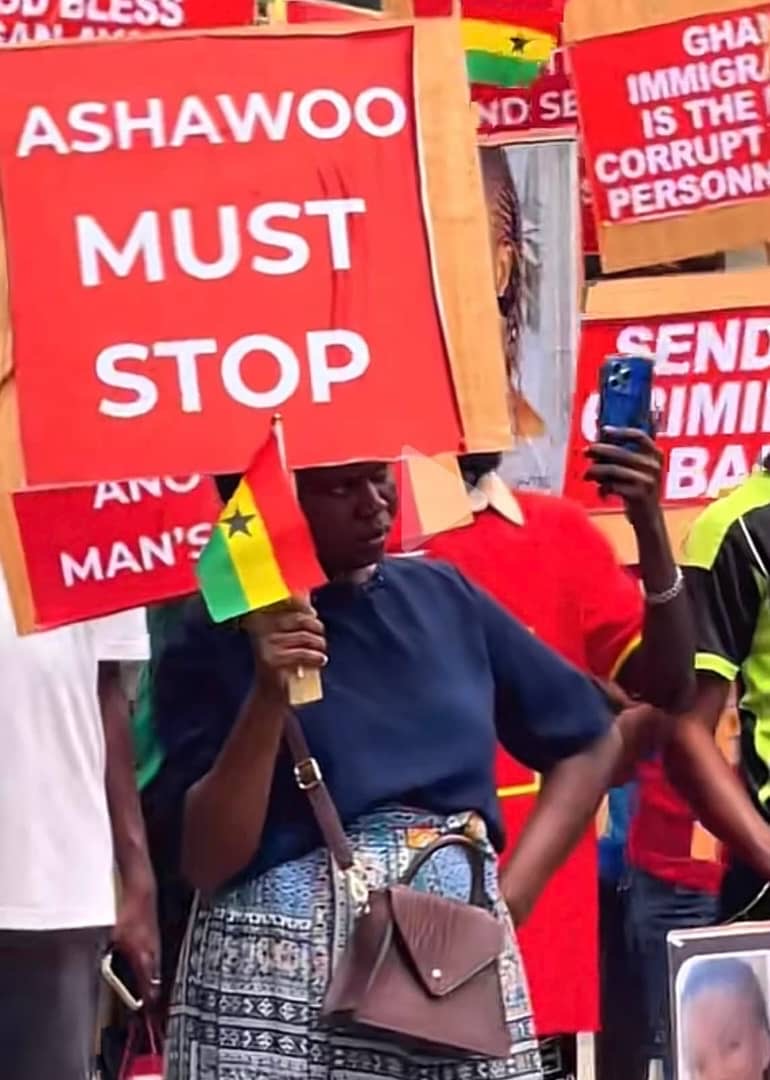Some Ghanaians on Saturday staged a protest at the popular Obra Spot in Accra, demanding the immediate expulsion of Nigerians from their country over alleged involvement in crime and social vices.
The protesters, who gathered in large numbers, displayed placards with messages such as “Nigerians Must Go,” “End Kidnapping,” “End Prostitution,” “End Armed Robbery,” “End Fraud,” and “End Ritual Murders.”
They accused some Nigerians of fueling insecurity and moral decay in Ghana, with some of the placards reading, “Who protects the right and freedom of Ghanaians?”,
“Nigerians are kidnapping and using people for rituals,” and “Our kids are getting missing because of Igbos.”
In a viral video obtained by SaharaReporters, several protesters are seen draped in the Ghanaian national flag while others donned red clothing — a traditional symbol of resistance.
One female protester, dressed in red and holding a placard, declared, “Nigerians must go because you cannot be in someone’s country and be doing anyhow.”
Another placard read: “Our Health At Stake Due to Mass Prostitution,” explaining growing public frustration over perceived health and safety risks allegedly linked to activities of some Nigerian nationals in the country.
The protest comes amid rising tensions between Ghanaian citizens and segments of the Nigerian community, following repeated incidents of criminal activity blamed on foreign nationals.
Another protester, riding on a motorcycle, explained how the presence of Nigerians in Ghana is fueling insecurity in the country.
He said a time would come when even they and their children wouldn’t be able to go out to buy something and return home safely.
He pointed to the incident involving an official of the Ghana High Commission, who recently died in Abuja, Nigeria, after a robbery incident.
He stated, “We know that we are all part of ECOWAS, but what is the purpose of this heavy Nigerian presence in Ghana? What are they really coming here to do? Now they are killing us. A time will come when you and I—and even our children—won’t be able to go out, buy something, and return safely.
“You can’t step out at night just to buy Indomie noodles. You and I can’t go to work and come home peacefully. Just look at what they did to our mother at the Ghana High Commission in Nigeria.
“The High Commission in Nigeria – they killed her inside her car. Why, Nigerians? Are you the only ones in Ghana? Are you the only people in the world?
“China is chasing Nigerians, South Africa is chasing Nigerians, Uganda is chasing Nigerians. Why is it always Nigerians — especially the Igbos and the so-called ‘Igbo King’?”
“This message is for him: he should stop calling himself a king in this land ever again,” he added.
Recent Controversy Over Igbo Monarchy In Ghana
SaharaReporters reported on July 8 that protests and intense public debate erupted in parts of Ghana following the installation of a traditional Igbo leader, Eze Chukwudi Ihenetu, as the “Eze Ndi Igbo Ghana” (King of the Igbo People in Ghana).
The development triggered a complex discourse around issues of sovereignty, cultural identity, and the limits of foreign community leadership in the country.
Youth organisations in Accra and the Eastern Region led the uproar, which escalated further after photos of Eze Ihenetu’s opulent palace in Accra—featuring regal emblems and elaborate architecture—circulated widely online.
Following the controversy, the Southeast Council of Traditional Rulers recently abolished the use of the title “Eze Ndigbo” by Igbo leaders residing outside Igbo land.
In a communique signed by prominent traditional rulers, including His Royal Majesty, Eze E.C. Okeke, (Eze Imo), and His Royal Majesty, Igwe Nnaemeka Achebe (Leader), the council introduced a new title, “Onyendu Ndigbo,” to be used by Igbo leaders in foreign lands or outside Nigeria.
According to the communique issued earlier in July, the decision was made to provide clarity on the use of the title “Eze” outside Igbo land, citing that it is a sacred traditional title exclusively reserved for recognised traditional rulers in the Southeast.
The council explained that a true “Eze” is enthroned and coronated by his community or kingdom following traditional rites, divinations, and sacred ancestral ceremonies, and must have a kingdom or community to govern.
According to the communique, the traditional rulers deemed it necessary to abolish the use of the “Eze Ndigbo” title in the Diaspora, citing that it is not a political or ceremonial title, but one deeply rooted in Igbo tradition and heritage.
The traditional rulers directed that a new title, “Onyendu Ndigbo,” should be adopted by all Igbo leaders in the Diaspora immediately.
The Council warned that failure to comply with the directive would be considered a serious act of defiance, misconduct, and disregard for Igbo traditional authority and judicial pronouncements.
Source : Shara Reporters

